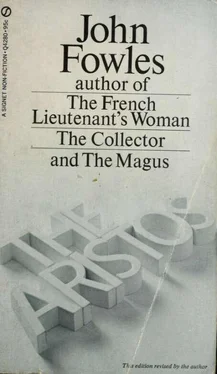John Fowles - The Aristos
Здесь есть возможность читать онлайн «John Fowles - The Aristos» весь текст электронной книги совершенно бесплатно (целиком полную версию без сокращений). В некоторых случаях можно слушать аудио, скачать через торрент в формате fb2 и присутствует краткое содержание. Год выпуска: 1970, Издательство: New York, N.Y. : New American Library, Жанр: Философия, на английском языке. Описание произведения, (предисловие) а так же отзывы посетителей доступны на портале библиотеки ЛибКат.
- Название:The Aristos
- Автор:
- Издательство:New York, N.Y. : New American Library
- Жанр:
- Год:1970
- ISBN:нет данных
- Рейтинг книги:3 / 5. Голосов: 1
-
Избранное:Добавить в избранное
- Отзывы:
-
Ваша оценка:
- 60
- 1
- 2
- 3
- 4
- 5
The Aristos: краткое содержание, описание и аннотация
Предлагаем к чтению аннотацию, описание, краткое содержание или предисловие (зависит от того, что написал сам автор книги «The Aristos»). Если вы не нашли необходимую информацию о книге — напишите в комментариях, мы постараемся отыскать её.
The Aristos — читать онлайн бесплатно полную книгу (весь текст) целиком
Ниже представлен текст книги, разбитый по страницам. Система сохранения места последней прочитанной страницы, позволяет с удобством читать онлайн бесплатно книгу «The Aristos», без необходимости каждый раз заново искать на чём Вы остановились. Поставьте закладку, и сможете в любой момент перейти на страницу, на которой закончили чтение.
Интервал:
Закладка:
‘GOD’
47 I put the word in inverted commas in order to except it from its common meanings; to purge it of all its human associations.
48 ‘God’ is a situation. Not a power, or a being, or an influence. Not a ‘he’ or a ‘she’, but an ‘it’. Not entity or non-entity, but the situation in which there can be both entity and non-entity.
49 Because people cannot understand that what is not can influence what is, they maintain that ‘God’ is and does. But our ignorence of ‘God’ and its motives will always remain infinite. To ask What is God? is as futile as to ask When does infinity begin and end?
50 Existence is ultimately or potentially knowable; ‘God’ is infinitely unknowable. The most we shall ever learn is why existence is as it is; why it requires such laws and such constituents to continue. We shall never learn ultimately why it is.
51 St Augustine: We know only what God is not . Existence is individual, therefore ‘God’ is not individual. Existence changes, therefore ‘God’ does not. Existence has power to intervene, therefore ‘God’ does not. Existence is finite, therefore ‘God’ is not. But ‘God’ is omnipresent, since all that exists (and is therefore individual) is not.*
52 ‘God’ is not; but its not-being is universally present, and universally affects. It cannot exist in any sense meaningful to material organisms; but that does not mean that this situation is meaningless to such organisms. If, for instance, you see two men fighting, but do not intervene (although you could have intervened), then in fact you intervene by not intervening; and it is so with ‘God’.
53 The whole is intrinsically a situation in which the principles and the events are all, and the individual thing is nothing. Since it is thus completely indifferent to the individual thing, ‘God’ must be totally sympathetic to the whole. But it expresses its sympathy by not being and by its total unknowability. It is wu wei and wu ming , without action and without name.
54 Tao Te Ching:
LXVII. If it resembled anything it would long before now have become insignificant
LVIL The sage says, I do nothing and the people change of themselves. I prefer stillness and the people correct themselves. I do not intervene and the people prosper by themselves,
LI. It gives the myriads life and yet claims no possession; it benefits them yet asks for no thanks; it looks after them yet exercises no authority.
X. Can you love the people and govern the state without resorting to action?*
55 If the individual thing suffers, it is so that the whole may not. This can happen only in a world of individualized matter, in which hazard, time and change are fundamental features.
THE CONTINGENCY OF MATTER
56 The concept of infinity bans any purpose except that of infinity. If we experience sensations of happiness, then it must be because matter in the form of human beings experiencing happiness serves the purpose of infinity, which is the maintenance of infinity. For to be happy to exist is to want to continue to exist.
57 But if the purpose of the whole is simply to prolong itself, what is the necessity of evolution, of causation, of complex physical laws? Why introduce the experience of pleasure, let alone the consciousness of pleasure? Why could not existence be an eternal stone in an eternal vacuum, or an infinite cloud of static atoms? To man the answer has always seemed simple. The gods wish their handiwork to be admired; they want libation, psalm and sacrifice. But this is the old and pernicious heresy of the anthropocentric universe, in which we humans are the Few and all the lower rest of creation, the Many. In such a universe we must assume a very active god; and one who is very much on our side, a suspiciously prejudiced figure to be in command of the whole.
58 Then why should matter exist at all? A single hydrogen atom must seem, if the sole purpose of infinity is infinity, a redundancy. But infinity cannot be of time alone. Time in itself, absolutely, does not exist; it is always relative to some observer or some object. Without a clock I say ‘I do not know the time’. Without matter, time itself is unknowable; and infinity does not exist.
59 Time is a function of matter; and matter therefore is the clock that makes infinity real. From our very special human standpoint some changes in the form of matter – such as the leap in anthropoid brain size, the appearance of self-consciousness, the discovery of tools, of language – are unmistakable evidence of some beneficent universal intention towards us. But all this might appear, to some hypothetical outside observer, a mere result of the effects of time on matter. He would not see it in terms of progress – the present complexity of matter might indeed seem to be a regress, a devolution, a superfluous ornamentation – but in terms of process.
60 To this outside observer all the special privileges we claim for our species, all the feathers in our cap, might seem as absurd as the exotic ceremonial finery of some primitive chieftain; of no more significance than the flowers in my garden for a surveyor. My flowers may mean a great deal to me; but I cannot assume that the purpose of evolution is to give them to me.
61 What we call evolutionary progress is so for nothing but ourselves. The very term ‘evolution’, with its assumption of development-from, is misleading. We are like the observer in sub-atomic physics who distorts the nature of the particle observed by the very act of observation.
62 This indifference of the process to the individual objects that constitute it, this ‘God’ which is a situation and not a person, which does not intervene, this blind obsession with the maintenance of infinity – all this may appear to leave our human world intolerably bare. But even here one can detect evidence of a universal sympathy. How can we not see? By not being in our sense of being, by not intervening, ‘God’ is a warning to us that Homo sapiens, like every other form of matter, is not necessary, but contingent. If our world is annihilated, and all of us with it, the whole will not suffer. It is madness, a delusion we inherit from our remotest ancestors, to suppose that thanksgiving can influence the course of events; that these man-like projections of our own wishful thinking can intervene on our behalf in the process.*
63 No one will save us but ourselves; and the final proof of the sympathy in ‘God’ lies in the fact that we are – or can by exercise become – free to choose courses of action and so at least combat some of the hostile results of the general indifference of the process to the individual.
64 Freedom of will is the highest human good; and it is impossible to have both that freedom and an intervening divinity. We, because we are a form of matter, are contingent; and this terrifying contingency allows our freedom.
MYSTERY
65 We shall never know finally why we are; why anything is, or needs to be. All our science, all our art, the whole vast edifice of matter, has its foundations in this meaninglessness; and the only assumptions we can make about it are that it is both necessary and sympathetic to the continuing existence of matter.
66 We want to be mastered, but we are masterless. We think always in a causative and hierarchical manner. The process and ‘God’ are co-infinite. Our finity cannot comprehend them, or their causelessness.
67 ‘God’ is caused by what it causes; is made necessary by what it necessitates; we cannot comprehend.
68 We go on living, in the final analysis, because we do not know why we are here to live. Unknowing, or hazard, is as vital to man as water.
Читать дальшеИнтервал:
Закладка:
Похожие книги на «The Aristos»
Представляем Вашему вниманию похожие книги на «The Aristos» списком для выбора. Мы отобрали схожую по названию и смыслу литературу в надежде предоставить читателям больше вариантов отыскать новые, интересные, ещё непрочитанные произведения.
Обсуждение, отзывы о книге «The Aristos» и просто собственные мнения читателей. Оставьте ваши комментарии, напишите, что Вы думаете о произведении, его смысле или главных героях. Укажите что конкретно понравилось, а что нет, и почему Вы так считаете.












